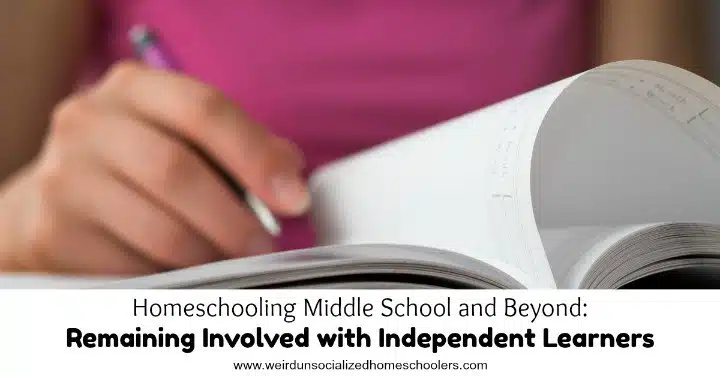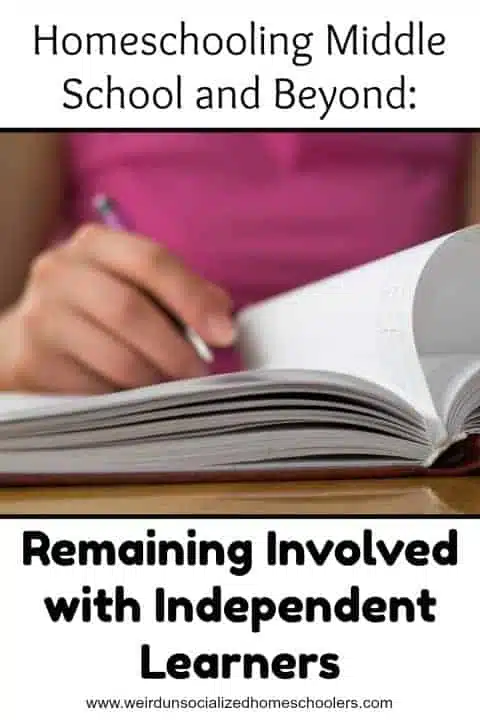Homeschooling Middle School and Beyond: Remaining Involved with Independent Learners
I’m not going to lie to you. After over 11 years of homeschooling, finally being in the season of homeschooling middle school and high school students, well, it rocks! The preschool and early elementary years are so much fun. It’s amazing to be such an integral part of a child’s early learning years. Everything is new and there are so many opportunities for hands-on projects, crafts, and all the things that make school fun.
However, homeschooling people who are becoming such independent thinkers and who are starting to take ownership of their own education is no less amazing.

The fact that these years can be much less mom-intensive is certainly a huge factor in my desire to perform a cartwheel or two when thinking of where we are now versus where we were just a couple of years ago. Having independent learners is nice, y’all. If you’re a mom who’s still in deep in the mom-intensive years, you might want to check out a post that I wrote recently for Simple Homeschool, How to Foster Independence in Your Homeschool Student.
I wanted to expound on one of the points I made in that article: When you’re homeschooling teens, some subjects may always require your guidance.
When you're homeschooling teens, some subjects may always require your guidance.I’m sure there are many out there who aren’t guilty of this, but I’m equally sure that I’m not alone in this: I expected near-complete independence from my oldest in areas in which she was not adequately prepared for such expectations. This homeschool mom mistake on my part created much more frustration in these areas than there ever should have been.
I’m not going to speak to what I should have done differently specifically with her because that feels too much like an invasion of her privacy. However, I do want to offer some general suggestions as to what remaining involved with your independent learners may look like.
Be prepared.
Think about the areas in which your child may struggle. They’re probably going to be the same general areas that were difficult during the elementary years. Knowing where your teen is likely to have difficulty can help you troubleshoot early on.
Read ahead in texts.
You may need to read your student’s textbooks a bit ahead so that you are up to speed if he needs you to explain a concept. There is nothing more frustrating than having to spend an excessive amount of time trying to figure something out so that you can explain it to your student. Don’t believe me? Just wait until she’s well into her high school science or math and doesn’t understand something. It’s been a long time since most of us did that stuff.
Work alongside them.
Some kids may need you to watch a video lesson or read the text with them so that you can work through some sample problems together or explain new or difficult concepts in a different way. We can all agree that not all kids learn the same way. Therefore, it stands to reason that the same explanation isn’t going to make sense to each of them.
Use abridged versions of books.
I know that sentence just raised the hackles of some of you, but abridged versions of books can play an important role in a student’s education. Some kids are really going to struggle with full versions of classic books. You can use the abridged version in several ways:
- Have your student read the abridged version first – preferably in elementary or middle school, not when it’s time to read the original.
- Let your student use the abridged version as a reference for difficult passages.
- You read the abridged version to refresh your memory of the storyline so you can paraphrase, if needed, or ask comprehension questions to make sure your student is understanding what he’s reading.
- Recognize that some students may need to read an abridged version in place of the original. I know that some people will disagree with this, but if you have a child who really struggles, reading an abridged version is, in my opinion, better than not reading any version.
Use audio books.
Struggling readers can greatly benefit from using audio books. Because it can help improve reading fluency, comprehension, and vocabulary, I like to use audiobooks in conjunction with print books. The student can listen to the words being read as his eyes follow along in the book. That’s also effective for helping them stay focused. I know my mind can wander when I’m listening to someone else read.
If you have a child who struggles with dyslexia, don’t miss my tips for homeschooling a child with dyslexia.

Be their tutor.
It bears repeating: Not all kids learn the same.
Be prepared to be your child’s tutor or, if they need more help than you can provide, hire a tutor. Some kids just need things explained in a different way. Some good online resources for your struggling student include:
- YouTube – There really are some impressive tutorial videos on YouTube.
- Khan Academy
- Algebra Help – I love this site! It shows step-by-step solutions for most types of algebra problems. That means, not only can your student find the correct answer, but she can see the process for finding it. It’s probably worth noting that I was the computer operator for that site. I didn’t want there to be the temptation to use it to find all the answers.
Be their editor.
First of all, I believe that modeling good writing as directed with writing curriculum such as WriteShop is very important for building a foundation. Beyond that, though, I don’t think there is anything wrong with being your student’s editor. Even professional writers have editors.
What I do is have my kids write their sloppy copy, then use a checklist to make edits before turning in their first revision to me. I make suggestions for edits using standard proofreading marks and notes of suggestions. I always tell them what they’ve done well (because who wants nothing but a list of what was wrong) and suggest areas of improvement (such as adding more description or developing a stronger closing sentence).
Then, I return their papers. They make necessary edits before turning in their final draft. This kind of feedback is important, helpful, and acceptable all the way through college, as far as I’m concerned. We all benefit from an extra set of eyes on our writing.
Schedule daily meetings.
A reader of my article on Simple Homeschool left a comment that I thought was brilliant. She said she schedules a daily meeting with her teen daughter. This is a great idea for remaining involved with independent learners. Having a specific time to meet with your teen ensures that it has a level of importance for both of you and doesn’t get overlooked.
A daily meeting holds your student accountable and gives you a chance to address any areas of struggle that he may be experiencing. (Click to tweet)
It gives them a sense of responsibility for their own work and schedule with the assurance that there is help available if they need it. Most homeschooled kids know that a parent is there to help when they need help, but it can be easy to push aside difficult assignments until they become overwhelming if there isn’t a consistent, specific time to address them.
Part of raising confident, independent learners is giving them the security of remaining involved in their education.
For those of you with older teens, what would you add to this list?
Kris Bales is a newly-retired homeschool mom and the quirky, Christ-following, painfully honest founder (and former owner) of Weird, Unsocialized Homeschoolers. She has a pretty serious addiction to sweet tea and Words with Friends. Kris and her husband of over 30 years are parents to three amazing homeschool grads. They share their home with three dogs, two cats, a ball python, a bearded dragon, and seven birds.



This is a great list. I’m bookmarking this. I honestly can’t think of anything you may have missed!
My daughter is just at the beginning stages of being more independent in her work. Besides daily reading time (for both of us!) we’ve divided work up into two areas. We spend about 2 hours together on subjects that I guide. Then, after lunch and an hour of free time she has her “homework time” and does everything that she can do independently.
Your tips are really helpful as I look ahead to guiding and fostering more independence. I LOVE this stage of learning.
That’s a great idea to divide your day up like that! That’s a really smart way to begin handing over the reins while still providing accountability and guidance.
Love, love, love this post, Kris. Yes to everything you said. I’m in the second time through with middle school/high school now and it is such a wonderful experience, if you help your child keep on top of it! Kids this age just blow me away with what they can do.
Thank you, Erin. I really appreciate that.
Great list, Kris! Thanks for being real and sharing your struggles and accomplishments in your home school. Your post has inspired me today!
We are on the cusp of middle school, and this is one of the best articles I’ve seen. Inspiring! Thank you!
YES! I love the idea of reading the abridged versions earlier. We have been doing this (in the elementary years) and I am so excited for them to start middle school equipped!
I give my teens a weekly checklist go by so they know where they should be. I encourage them to stay on task and ask questions when they are having an issue. I will pick random days to sit with them and ask them what they are working on and to explain it to me. We use an outside grading service for their writing so I act as their editor as well but they are required to type and submit it themselves. I also keep a copy of their checklist so I know where they should be and can check off items as they are turned in. If something doesn’t get turned in, it’s a flag to check in on that subject with them. We also have a Monday morning “staff meeting” where we go over what has to be done this week and see what our agendas are for upcoming events, what needs to be given extra attention or completed ahead of schedule.